20 Foods To Eat For A Healthy Skin!
By Mansi Shah +2 more

Get,

to manage your symptom
Get your,


4 Cr+ families
benefitted

OTP sent to 9988776655



You’ve successfully subscribed to receive
doctor-approved tips on
Whatsapp

Get ready to feel your best.

Hi There,
Download the PharmEasy App now!!


Register to Avail the Offer
Send OTPBy continuing, you agree with our Privacy Policy and Terms and Conditions

Hi There,
Sign up on PharmEasy now!!
Trusted by 4 crore+ families

OTP sent to 9988776655



You have unlocked 25% off on medicines




Code: NU25

Comments


Leave your comment here
By Mansi Shah +2 more
Table of Contents
Pollution, the sun, stress, lifestyle habits, and aging can affect the natural appearance of the skin. While we can’t always avoid these influences, making mindful dietary choices may help support skin health from within. A balanced, nutrient-rich diet may contribute to maintaining a healthy complexion and enhancing your skin’s natural glow, without the need for costly salon treatments.
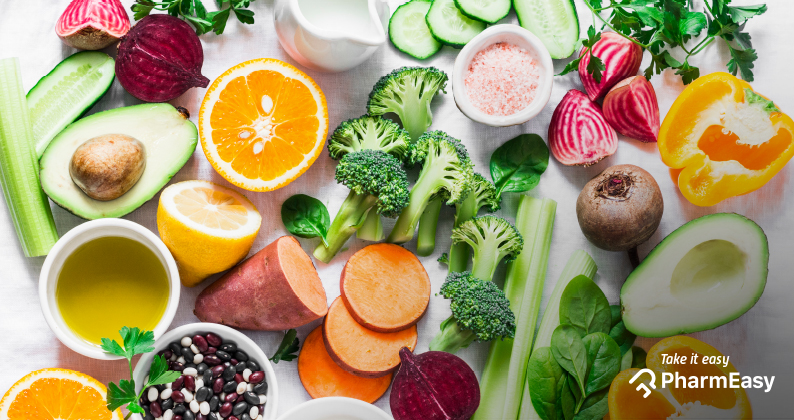
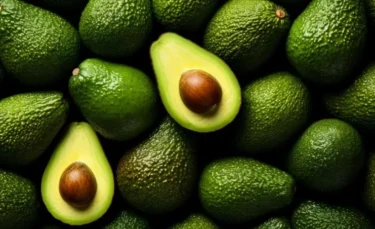
Elastin and collagen are proteins that help keep the skin soft and supple. As we age, the natural production of these proteins decreases, which can lead to reduced skin elasticity. While this is a normal part of ageing, avocados are a source of healthy fats that may help support skin health and hydration as part of a balanced diet.
Research1 shows that healthy foods keep your skin taut and bouncy. Avocados also shield your skin from the harmful UV rays of the sun.
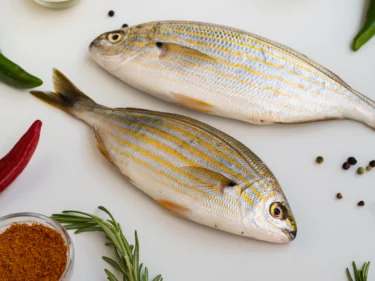
For individuals who include animal proteins in their diet, fatty fish are a valuable source of omega-3 fatty acids. These healthy fats are known to support heart health and may contribute to improved blood circulation. Good circulation is important for maintaining skin hydration and a healthy appearance. A lack of omega-3 in the diet may be associated with dryness or dull skin texture2.
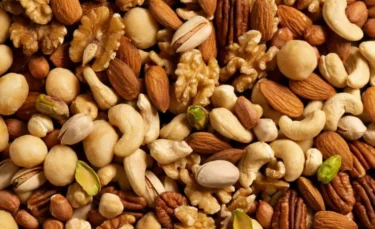
Nuts and seeds are known to contain healthy fats and vitamin E, which may help keep the skin hydrated and smooth. They also provide nutrients that may support the body’s natural collagen production, contributing to the maintenance of skin suppleness3.
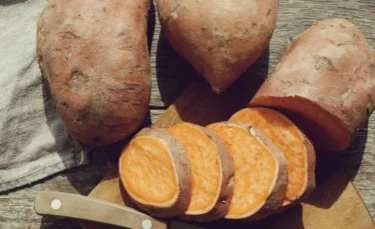
Vegetables like carrots and sweet potatoes are rich in beta-carotene, a powerful antioxidant that the body converts into vitamin A. This nutrient may help maintain soft, healthy-looking skin and may support the skin’s natural defences against sun exposure. Beta-carotene is also found in other brightly coloured fruits and vegetables such as apricots, cantaloupe, mango, papaya, and pumpkin.
Additionally, carrots are a source of magnesium, a mineral that plays a role in relaxing muscles and supporting restful sleep, something that may indirectly benefit skin health4,5.
Including coffee in your diet in moderation may offer certain benefits for skin health. Coffee contains polyphenols, which are antioxidants that have been studied for their potential role in supporting the skin’s natural defences against photoageing (sun-induced skin changes) and hyperpigmentation (dark patches on the skin). While promising, these effects require further scientific validation.
Dr. Rajeev Singh, BAMS
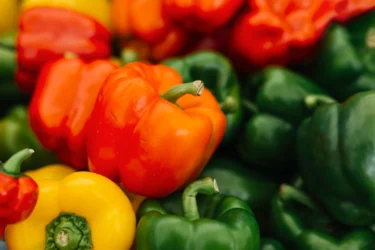
Yellow and red bell peppers are also packed with Vitamin A and vitamin C, which may help repair skin, by promoting the growth of new cells, and boost the production of collagen5.
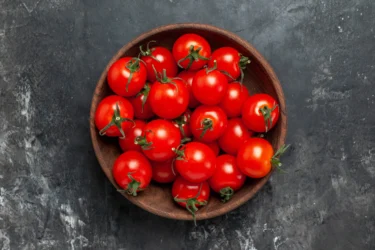
Tomatoes contains carotenoids such as lutein, beta-carotene, and lycopene among others. These compounds have been studied for their potential to help protect the skin from environmental stressors, such as pollution and sun exposure, and may help reduce the appearance of wrinkles over time. However, further research is needed to fully understand these effects4,5.
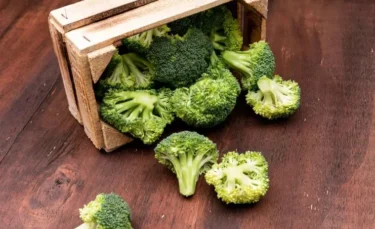
Broccoli is packed with essential nutrients such as carotenoids, zinc, and vitamins A and C, all of which may support healthy skin. It also contains sulforaphane, a compound that has been studied5 for its potential protective properties, including its possible role in preventing various types of cancer, including skin cancer. However, further research is required to confirm these effects.
According to research11, adding barley to your diet may offer potential benefits for skin health. Whole grains like barley, when included in a low glycaemic index (GI) diet, may help manage acne and support overall skin health. Moreover, barley is rich in essential nutrients, including selenium and various vitamins and minerals, which may support the growth of healthy skin, hair, and nails.
Dr. Smita Barode, B.A.M.S M.S.
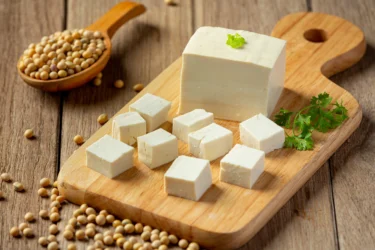
Soy products contain isoflavones, which are compounds that may help support skin health by potentially preventing the formation of wrinkles and maintaining skin’s softness and suppleness4. However, more research is needed to fully understand the extent of these effects on skin ageing.
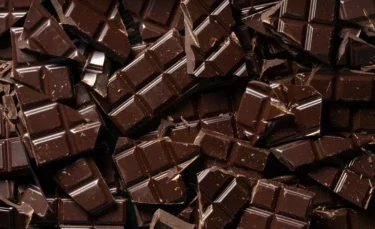
The cocoa powder found in dark chocolate may contribute to skin hydration and softness. It has also been studied for its potential to help the skin become more resilient to sun exposure, potentially reducing the risk of sunburn3. However, more research is required to fully understand these effects.
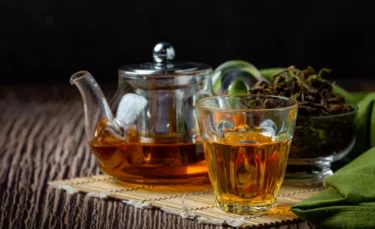
Green tea flushes out toxins from the body and may help bring a clear and shining appearance to the skin. It helps reduce the damage done to the skin by sun exposure and pollution3.
Green tea is well-known for its anti-inflammatory effects as well as its potential to help in the protection of cell membranes.
Soft, healthy skin is often a reflection of overall well-being. Incorporating these easily accessible foods into your diet may help protect and repair your skin from harmful environmental factors.
Passion fruits are not only a delicious treat but may also offer potential benefits for the skin, particularly due to their edible seeds. These seeds are rich in polyphenols, natural compounds with antioxidant properties. Including passion fruit in your diet may help protect the skin from oxidative stress and support overall skin health12. However, further research is needed to fully understand these effects.
Dr. Anuja Bodhare, B.A.M.S M.D (Ayu)
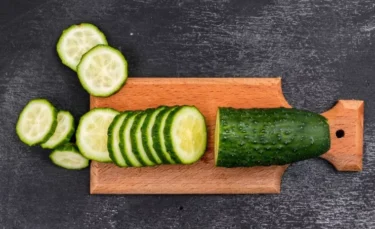
Cucumbers are often considered beneficial for enhancing beauty due to their potential positive effects on the skin, such as lightening the skin, as well as reducing wrinkles and fine lines. The application of cucumber juice to the skin may help in making it feel soft and radiant5. However, more studies are needed to confirm the full range of benefits cucumbers offer for skin health.
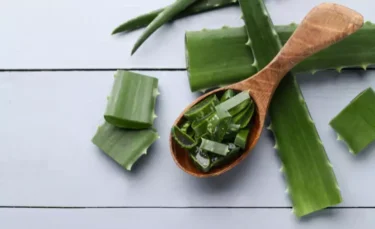
The application of aloe vera to the skin may help maintain hydration, potentially improve skin elasticity, and possibly support the prevention of wrinkles. However, further research is needed to fully establish these effects6.
Also Read: 8 Best Anti-Aging Foods to Look Younger
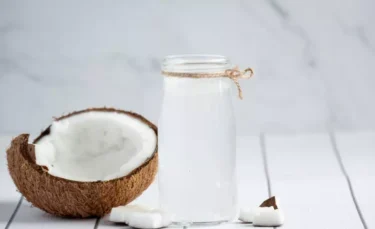
Coconut water is often considered beneficial for skin health. Drinking it may help keep the skin hydrated and promote a healthy, glowing appearance. Additionally, applying coconut water to the skin may have soothing effects. Its potential antifungal, antibacterial, and anti-inflammatory properties could help protect the skin from infections and may support acne prevention. While it may help in reducing signs of aging, further studies are needed to confirm these benefits7.
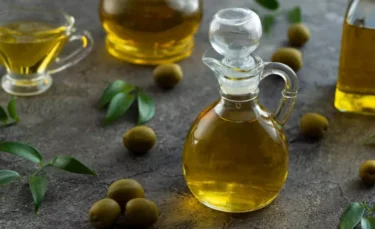
Vitamin E and antioxidants in olive oil may help keep the skin healthy, hydrated, and moisturised. It may also help with acne, fine lines, and wrinkles.
Olive oil may also effectively lighten scars and stretch marks4.
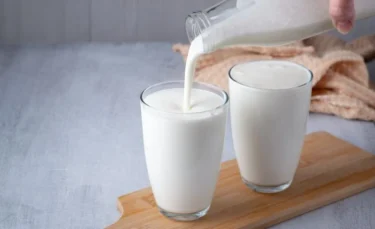
Buttermilk contains probiotics, which may support digestive health and contribute to the natural elimination of toxins from the body. It also contains lactic acid, which is often used in skincare for its gentle exfoliating properties and may help maintain healthy-looking skin8. However, further research is needed to fully understand these effects.
Also Read: High Energy Giving Foods To Solve Your Energy Woes
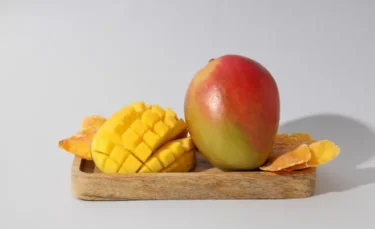
Consuming mangoes in moderation may contribute to skin health, as they are rich in vitamin C, which may help reduce acne and support clearer pores. Mangoes also contain beta-carotene and vitamin A, nutrients known for their antioxidant properties. These compounds may assist in maintaining smooth skin and supporting the skin’s natural repair process. Similar nutrients are also found in winter squash, sweet potatoes, carrots, cantaloupe, and apricots.
Some studies4 suggest that the antioxidants in mangoes may help the skin respond better to environmental stressors such as UV exposure, although more research is needed to confirm this effect.
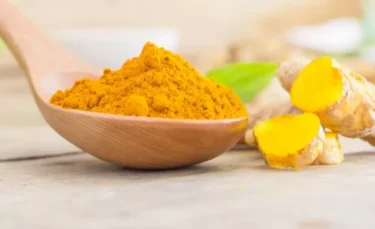
Turmeric is known for its anti-inflammatory, antimicrobial, and antioxidant properties, which may support overall skin health. It has been traditionally used for its potential to soothe the skin, promote a more even tone, and support the skin’s natural healing processes. Turmeric may also help in reducing the appearance of dark circles and in maintaining a radiant complexion4. However, more clinical studies are needed to confirm these effects.
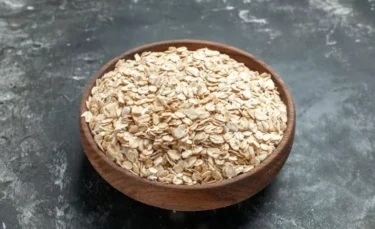
Oats contain saponins, which are natural cleansing agents that may help remove dirt and excess oil from the skin while gently exfoliating it. Their antioxidant content is also believed to support the removal of dead skin cells and help moisturise dry skin. When used in a face mask, oats may assist in absorbing excess oil, potentially reducing the likelihood of breakouts.
Oats are also a source of selenium, an antioxidant that may support cellular protection, and they contain prebiotics that help nourish beneficial gut bacteria, potentially supporting immune health9. Further research is needed to establish the full extent of these effects.
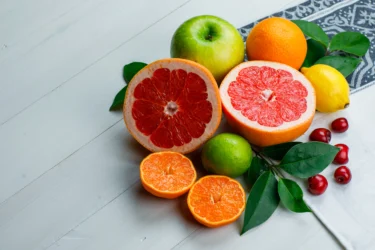
Citrus fruits such as oranges, lemons, and kiwis are rich in vitamin C, a nutrient known to support immune function. Their natural antioxidant and antibacterial properties may help protect the skin from environmental stressors and contribute to a clearer complexion. Regular consumption of citrus fruits may also support skin radiance and help maintain a youthful appearance by potentially slowing down visible signs of ageing3.
However, further studies are required to establish the extent of these effects.
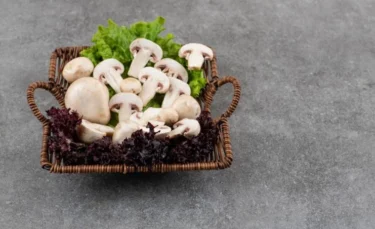
Mushrooms are rich in vitamin D, selenium, and antioxidants, which may support skin health. These nutrients have been studied for their potential role in protecting the skin from environmental stressors and maintaining its overall condition. Including mushrooms in your diet may help reduce the appearance of blemishes and support a more even skin tone. They may also contribute to slowing visible signs of ageing, such as fine lines and wrinkles10.
Read More: 16 Home Remedies for Glowing Skin
If you don’t consume fish, you may still be able to support your omega-3 intake through plant-based options. Flaxseeds, for example, are a well-known source of plant-derived omega-3 fatty acids. A helpful tip is to add ground flaxseed to smoothies, yoghurt, or oatmeal as part of a balanced diet.
Dr. Siddharth Gupta, B.A.M.S M.D (Ayu)
The foods we consume can significantly impact the health and appearance of our skin. A nutrient-rich, balanced diet that includes a variety of skin-boosting foods such as avocados, fatty fish, nuts, and vegetables rich in antioxidants can support skin hydration, collagen production, and protect against environmental stressors. By making mindful dietary choices, you can naturally enhance your complexion and maintain youthful, radiant skin without resorting to costly treatments. Additionally, incorporating foods such as green tea, turmeric, and citrus fruits may further support your skin’s resilience and overall health.
Also Read: 10 Home Remedies For Freckles & Clear Skin
Disclaimer: The information provided here is for educational/awareness purposes only and is not intended to be a substitute for medical treatment by a healthcare professional and should not be relied upon to diagnose or treat any medical condition. The reader should consult a registered medical practitioner to determine the appropriateness of the information and before consuming any medication. PharmEasy does not provide any guarantee or warranty (express or implied) regarding the accuracy, adequacy, completeness, legality, reliability or usefulness of the information; and disclaims any liability arising thereof.
Comments

Leave your comment...

View all comments(1)
You may also like
This article was really nice with the different foods and their properties. I’m also searching for foods for better skin and having a list like this is always appreciated.